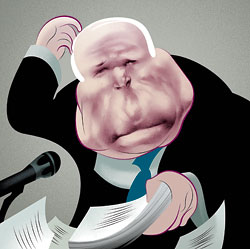He’s running her same campaign. And she lost.
 |
Illustration by André Carrilho |
Feel free to tell me I’m nuts for asking the question, but doesn’t it seem that, more and more, the McCain campaign is turning into the Clinton campaign?
The comparison smacked me upside the head last week, when the turmoil and melodrama attending the internal functioning—or, rather, dysfunctioning—of the Republican nominee’s organization burst into public view. Just a few days after John McCain had shaken up his operation, demoting his campaign manager Rick Davis and elevating bullet-headed adjutant Steve Schmidt to a position of putative near-total authority, Bill Kristol confidently predicted in his column in the Times that McCain would soon bring consultant Mike Murphy aboard as the campaign’s chief strategist. Kristol wasn’t flat wrong, or so I’m told by a longtime McCain confidant. The Arizona senator did indeed offer the gig to Murphy, who served on McCain’s 2000 primary bid and whose counsel the candidate had been receiving on the down-low for months. But the outcry among McCain’s other advisers, many of whom openly loathe Murphy, was simply too intense. So a little more than 24 hours after Kristol’s column was published, Murphy announced that his reentry wasn’t gonna happen; instead, he would be going to work for MSNBC.
Now, it’s fair to point out that strife is nothing new to McCain campaigns, which tend to be less well-oiled machines than spastic-goat rodeos. Yet it’s hard not to see the similarities between the chaos afflicting McCain-land now and what went on in Clinton-world during the primaries. In the former, like the latter, you have an outfit with no clear lines of authority, rife with elephantine egos and feuding factions that have been at each other’s throats for years, none with the slightest compunction about bearing their animosities (albeit anonymously) in the press. And in McCain, like Clinton, you have a candidate who not only tolerates but seems to encourage an atmosphere of anarchy—and who finds it difficult to fire anyone, no matter how incompetent.
If the commonalities ended here, they would hardly be worth noting. In presidential races, personnel and mechanics matter, but only on the margins. Yet in ways large and small, strategic and tactical, temperamental and attitudinal, the McCain campaign strikes me as having been cut from the same cloth as Hillary Clinton’s. Same story with the candidates themselves, in particular when it comes to their jaundiced perceptions of their rival. For supporters of Barack Obama, this might seem cheery news, since those perceptions led Clinton time and again to misplay her hand. But general elections are very different from primaries—and there are reasons to worry that Clintonianism, taken to its logical (and gruesome) extreme, may serve McCain better than it did the real McCoy.
That Clinton and McCain would run similar races might seem odd. Their ideological differences are severe, and no one sane would ever call Clinton a maverick or McCain a feminist. But it’s also true that they share a view of politics and policy. They venerate the Senate as a noble institution, not as the imagination-deadening, soul-destroying hellhole that it is. They regard legislative experience, forging compromises in the trenches, as formative and indispensable. They see having national-security chops as a sine qua non for sitting in the Oval Office.
It was this conception of politics and the presidency, however, that got Hillary into so much trouble in her battle with Obama. And while McCain largely avoids the rhetorical traps she fell into—the laundry-listy rhetoric, the countless small-bore policy proposals—the thrust of his campaign is much the same as hers was: The emphasis on résumé, the willful avoidance of grappling with the desire for change so evident in the electorate, and, perhaps most problematic, the eschewal of big, bold, animating ideas and grand thematics.
This was not, it should be said, the kind of campaign that McCain and his advisers planned at the outset. Back in the days when McCain was still being guided by John Weaver, the strategist–cum–soul mate who crafted his message in 2000 and then fell out of favor in mid-2007 when McCain’s campaign imploded, the idea had been to run on a handful of sweeping reformist goals—entitlement reform, ethics reform, immigration reform, spending reform, etc.—and position McCain as willing to put country ahead of personal political ambition. How? As reported first by The Atlantic’s Marc Ambinder, when McCain announced his candidacy, he was “inches away” from pledging to serve only one term if elected. “It would have been the most selfless act in modern American politics,” a Republican told Ambinder—and one that would have served as a powerful contrast point in a race against either Clinton or Obama.
But McCain was persuaded at the last minute to abandon the idea by his friends Senator Lindsey Graham and former senator Phil Gramm—just as Clinton was convinced not to run a bolder, more human campaign by the more conservative voices in her sphere. Since then, McCain’s effort, like Clinton’s, has been increasingly poll-driven (offshore oil drilling, anyone?), corporate (the phalanx of lobbyists that surrounds him, robbing him of his reformist cred), and almost entirely lacking any positive vision of what he wants to achieve as president, beyond winning the war in Iraq. Indeed, McCain’s assorted flip-flops, notably regarding his position on the Bush tax cuts, have left him vulnerable to the charge that was ultimately most damaging to Clinton and is even more damaging to him, given his image as a principled straight-talker: that he will say and do anything to win.

No comments:
Post a Comment